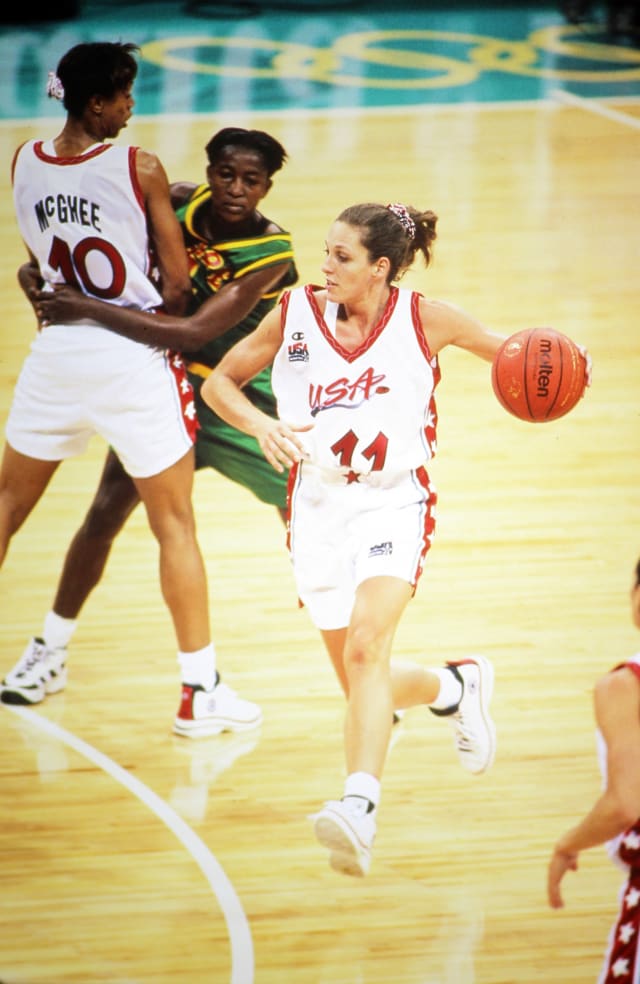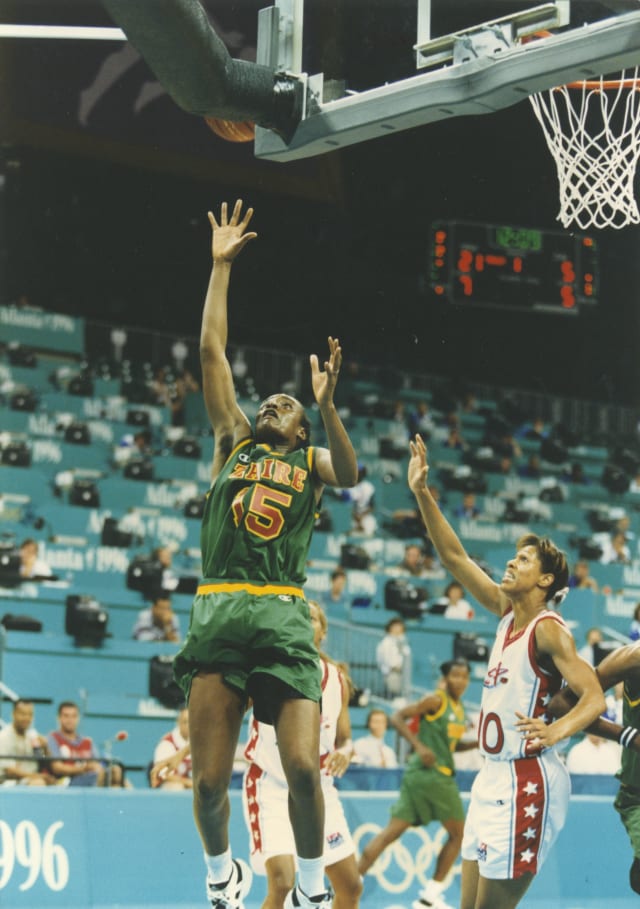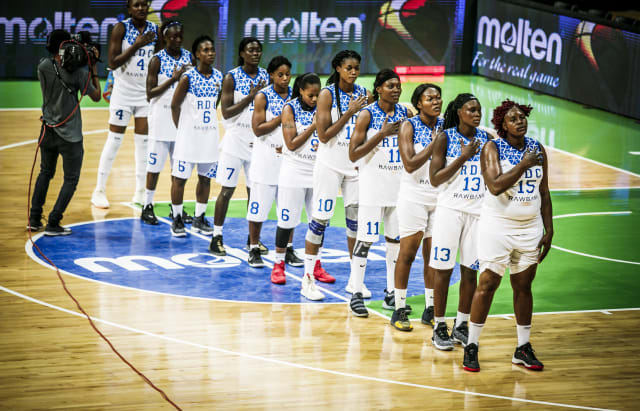How the Olympics changed the life of Congolese legend Mwadi Mabika
ATLANTA (USA) - NBA legend Dikembe Mutombo already knew who Mwadi Mabika was from his regular trips to their native Democratic Republic of Congo, but he didn't know how good she would become.
ATLANTA (USA) - NBA legend Dikembe Mutombo already knew who Mwadi Mabika was from his regular trips to their native Democratic Republic of Congo, but what the then Atlanta Hawks star didn't know was how great she would become down the line.
And although Mabika achieved huge success with the Los Angeles Sparks, fate dictated that the city of Atlanta would play a significant part in the two-time WNBA champion's life.
It was in Atlanta, while representing Zaire (renamed Democratic Republic of Congo) at the 1996 Olympics, that Mabika made her introduction to the basketball world.
It was also from Atlanta that we caught up with Mabika via telephone. We asked her to take a trip down memory lane and reflect on how basketball transformed her life for good.
A two-time FIBA Women's AfroBasket participant, Mabika shed light on the future of basketball not only in DR Congo, but also in Africa.
We can't tell your story without going back to your native Kinshasa where you played basketball with boys of your age, until the day Dikembe Mutombo showed up. You were 18 or 19, right?
I am blessed that I had an opportunity to be seen by Dikembe Mutombo that brought me here to America. It was something that I didn't think that would happen in my life. Dikembe helped me to achieve my dream.
He attended a tournament in DR Congo. And obviously, I was the best player in that tournament when he came. He called me and said: "Keep working hard, and we are gonna see what happens." The following year we had to come to the 1996 Olympics in Atlanta. I was one of the best players there (Editor's note: Mabika ranked as one of the top scorers with an average of 17.3 points per game). And a lot of college teams were impressed with me. They were contacting Dikembe while I was playing.
Colleges such as Georgetown University, Howard University and Old Dominion University, all of them, were trying to get me. Dikembe told me: "Listen, I heard that a lot of players are trying to stay in America, but as your brother I will advise you to go back because such and such university want you to play here. It's best for you to go back to Congo and I will take care of you. I will send all the information, and you will be able to comeback to America." I trusted him and I went back to Congo. Then, he did everything he could to help me return to the United States. That's basically how everything started.
Mwadi Mabika appreciation post🥰#TBT #GoSparks #LeadTheCharge pic.twitter.com/4KYeKr8uGE
— Los Angeles Sparks (@LASparks) March 26, 2020
You returned to the US in 1997, signed with the Los Angeles Sparks for the inaugural WNBA season, but even though you had a tremendous success winning two league titles you remained committed to your national team. How significant was it for you play for your national team?
It was very significant because the national team was the reason why I was able to be seen from all these teams in America. I was always grateful. People who know me, they know that I am Congolese by heart. My heart is in Congo. Even now that I am retired I own a lot of things there. I travel to Congo every year. If it wasn't for my daughter I would move back to Congo. My daughter is eight years old, and she is the reason I am here for her education. But really my heart is in Congo.
It was always my pleasure to go back and give back to my national team and give back to my teammates and all the young kids. They were trying to be that me. And I always tried to show them what it takes to become a professional basketball player.
DRC & @WNBA great Mwadi Mabika in the house tonight cheering for the @LeopardsBasket. ⛹🏽♀️🇨🇩💪🏽🐆 pic.twitter.com/Gy2FaYzwH5
— DR Congo Basketball (@LeopardsBasket) June 18, 2017
Let's go back to the 1996 Olympics. You were one of the youngest players on the team, turned 20 during the Olympics, Zaire played against the USA, Ukraine, Australia, Korea, Cuba, China and Canada. What went through your mind playing against those big teams, and super talented players?
I played against my future LA Sparks teammate Lisa Leslie. We were very impressed, it was an overwhelming experience for us. It is still a dream of anybody to play in the Olympics. Just being this young kid from Africa, and all of sudden being in America playing on the big stage like that, it was great. And a couple of years later I had an opportunity to play on the same team as those players that I played against in the Olympics.
 Mwadi Mabika is seen in action against eventual 1996 Olympics winners USA
Mwadi Mabika is seen in action against eventual 1996 Olympics winners USA
Let's not forget that Zaire in 1996 became the first African country to ever play at the Women's Olympic Basketball Tournament.
I didn't even know that. I am just learning it from you. Anyway, we had a great team, and our president Mobutu [Sese Seko] back in the day, he was really into women's basketball. Every time we went to play these big tournaments such as the African Championships and all that, we were well taken care of. That's why we had the opportunity to go to the finals and win [the 1994 African Championship] and go to the Olympics. Hopefully we go back to that.
 Mukendi Mbuyi (Zaire)
Mukendi Mbuyi (Zaire)
Obviously, you played at FIBA Women's AfroBasket twice (2005 and 2007), you played for Zaire at the 1993 Junior World Championship in Korea. You seemed to have witnessed some big moments of Zaire's women's basketball.
Things have changed. There is no a lot of structure. There is not a lot of people supporting financially, not only the national teams. In the past, before the national teams, we had to have good club teams first and good coaches. We had people that taught the kids fundamentals of the game. That's what we need right now, structure. But everybody wants to be the boss, but the structure isn't there, and the people that funded the teams financially are not there.
 DR Congo finished sixth at FIBA Women's AfroBasket 2019
DR Congo finished sixth at FIBA Women's AfroBasket 2019
I feel the responsibility of restoring women's basketball back home. Unfortunately the mentality is not the same. There is a bunch of things that happened while I was trying to make it happen and I didn't really like what happened. So I decided when I am ready, I will be back living in Congo and create my own thing. I want to create my own basketball team. I am gonna teach them by myself.
And, what plans, if any, have you got for basketball in your country? How difficult is it, for example, to set up a Mwadi Mabika basketball camp in Kinshasa or elsewhere in the country?
It's not difficult at all. In Congo, as long as you bring your own stuff, gears, basketballs, kids are all for that. [The issue is] when you tell someone how to structure the team and the whole thing, some get offended. I had an opportunity to do camps a couple of times, I tried to do my best, that's not a problem at all.
Nigeria and Senegal are clearly the top two teams in Africa's women's basketball. Both teams did really well at the FIBA Women's Basketball World Cup 2018. From your perspective, how do you process their success?
The reason why they are playing well is because they have a lot players in college basketball in America. They are taking advantage of the American system and they are willing to go back to play for their national teams. Comparing them to my country, every player that we try to bring in here, a lot of them don't go far. Some of them don't go to school anymore, the mentality is totally different. We don't have a lot players that play here in America. If you don't have that, [you have to] have at least good structures, foundations.
So @LisaLeslie wanted a Mwadi Mabika tape, well here it is😤#GoSparks #LeadTheCharge pic.twitter.com/7PTKIx91t2
— Los Angeles Sparks (@LASparks) March 27, 2020
When you look back in time, what comes to your mind? How did you adjust to professional basketball not only in the US, but also in Europe where you played during the WNBA off seasons?
It was a great experience. One thing that I learned in sports in general in America is that you have to work hard. If you do that you are gonna see results. Don't want to talk too much about myself, but I was one of the reasons we won, especially the second [2002 WNBA title] one. I decided not to go overseas, I decided not play for any European team because my knee was bothering me. I wanted us to get better as a basketball team. I talked to my team and said this year I am not going [overseas]. I decided to stay and work out with [LA Sparks head coach] Michael Cooper for the whole six months. After all these workouts, that was the year that I felt it was the best year of my life. I was a runner for the MVP, I was in the WNBA first-team, I was an All-Star, and that led us to our second championship title.
What message would you send to young players wanting to become a Mwadi Mabika?
Be patient, work hard, especially if you are a girl play a lot of street ball with a lot of boys and it will help you be stronger, and have faith. I used to play with them all the time. I was really passionate about basketball. I remember when I used to watch NBA teams like the Chicago Bulls and Michael Jordan, every time I saw Jordan doing a move on the TV, after school, I would take my ball to the basketball court and tried to do the same thing. I really wanted to be one of the best. Every time when you play with the boys, women weren't going to intimidate you.
Congolese basketball legend and former @LosAngelesSpark Mwadi Mabika teaching skills at the #nbaacademy in Senegal. She spoke about her experiences playing in the @WNBA and representing DR Congo internationally....
— DR Congo Basketball (@BasketballCongo) November 14, 2019
Video courtesy of @ThierryKita#drcongobasketball #congohoops pic.twitter.com/sgG8ACkut7
Which player, or players, did you look up to growing up?
Cathy Lingenga was the player that I used to look up to. She was one of the best players in Africa. When Zaire was winning all those championships it was because of her. If we had the WNBA at the time she would have been one of the best players in the WNBA. As for the NBA, of course Michael Jordan was my favourite.
FIBA